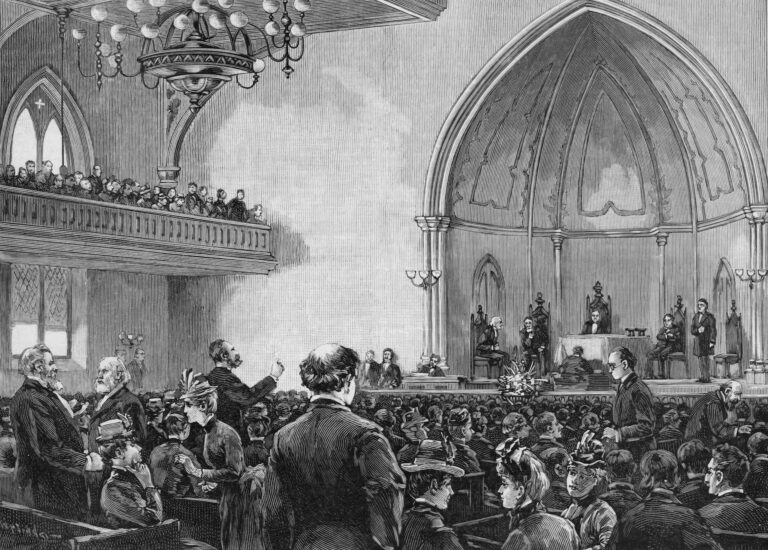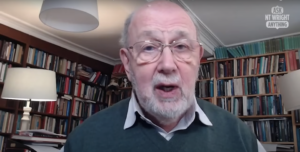I grew up in a church that used the video-venue model to expand its ministry. Some of the weekend services featured live preaching. At other times, the sermon was a video of the sermon from a previous service. Many churches (especially large ones) find it to be a cost-effective way of expanding their ministry and making the most of the speaking gifts of their primary teacher. We have the technology and a gifted communicator, why not multiply our ministry by adding video venues? Pragmatically, it works. But should pragmatics drive our ecclesiology? Are there unintended side-effects to video preaching?
While many churches use video venue to great effect, I have not seen as many people thinking through its implications. In this article, I want to raise five questions that churches should wrestle with before using video preaching.
Does it exacerbate the problem of celebrity pastor syndrome?
Celebrity pastor syndrome is killing us. We’ve made the work of shepherding into platform-building. We have built churches around the gifting of a single leader. Using video preaching plays right into this weakness. It tends to reek of empire-building. What are we communicating when hundreds of Christians gather together, but we are not able to find a single person in the room competent to open God’s Word faithfully? Does faithful preaching require such rare giftedness and charisma that we need to stream biblical teaching from The Guy at the main campus? Is our church growth strategy entirely dependent on the charisma and gifts of one preacher?
When our style of ministry insists that only our celebrity pastor is able to preach, it only exacerbates this problem that we ought to be intentionally fighting against. We would be better served by giving opportunity and training to more preachers from within the church, which would serve to model that the church is not about one charismatic leader, but is built on the Word of God.
Does it hinder the God-ordained relationship between the preacher and his people?
The most common biblical analogy for pastoral work is the image of the Shepherd. A Shepherd is among his sheep. He knows them. They know him. He smells like his sheep as he works in their midst. Peter instructs church elders to “Shepherd the flock of God that is among you.” (I Pet 5:2). Doesn’t “among you” imply relationship and presence? They are to be “examples to the flock” (I Pet 5:3). The Pastor is meant to be known and accessible. He can be observed, approached, and known. More than a message, he is a man who embodies that message. He is a living example. We miss something significant when we reduce the preacher to a message on a screen.
Does it undermine the role of the Holy Spirit in preaching?
As preachers, we have those moments when the Holy Spirit moves us to abandon our notes and to follow his prompting. We can sense God doing something in the room, and we pause and leave room for that. How does the preacher know the mood of the room if he is not in it? How does he know when to pause, when to stop, when to follow the Spirit’s leading? To me, it feels a bit presumptuous to assume that the Spirit will move in the re-runs the way he did before the live audience.
I know the pushback that’s coming. Yes, of course the Holy Spirit can work even if the sermon was prerecorded or preached to a different audience. The Holy Spirit can work through online preaching, just as he can through a written word, an audiobook, or even through the old sermons on cassette tape in your mother’s basement.
So maybe I’m the one limiting the Holy Spirit. And yet I believe there is something crucial happening as the preacher prayerfully responds to the promptings of the Spirit and the mood of the live congregation.
Does it miss the opportunity to train more preachers?
A great preacher knows not only how to preach a great sermon but is able to empower others to preach as well. Paul exhorted Timothy to take the Word he had received and “entrust [it] to faithful men, who will be able to teach others also” (2 Tim 2:2). We have a responsibility to train up other preachers. In the video preaching model it seems as though preaching is a gift limited to one exceptionally charismatic leader and no others.
But If none of the Pastors or Elders in the church are “able to teach”, in what sense are they qualified to be elders (I Tim 3:2)? A few years ago I was preparing to take a sabbatical and had to decide how the pulpit would be filled in my absence. We decided that the church would be best served by hearing from their own pastors and lay elders rather than a stream of guest preachers. What the homegrown guys may have lacked in theological education, experience, gifting or skill, they more than made up for in pastoral heart. This was their church, their people and they were known. These were not strangers, but men whose character, godliness, and passion were known and respected.
Does it underestimate the value of physically gathering?
A church is a gathering, located in a time and place. Yes, there is the universal church, but the primary way the New Testament talks about the church is to talk about a physical gathering of God’s people at a specific time and place. We gather not as disembodied souls, but as embodied persons. There is a physicality to our gathering. The church is an ekklesia, a gathered people.
On the other hand, video preaching is un-incarnation. The preacher is not gathered with God’s people. He’s in another place, even another city or province. As our lives become increasingly digital, it does not seem wise to me for churches to go further down that road of un-incarnation. Instead we need to recover the value of gathering and being present together. We miss this when the preacher isn’t even in the room. He’s not gathered. He’s not physically present. He’s just a message. We should not allow pragmatics overshadow our ecclesiology.
Church is not just a content delivery mechanism that can be digitized. It is a particular people who physically gather for worship and the Word and submit themselves to the leadership of local elders. Un-incarnated preaching seems to devalue the gathering of God’s people and harm our understanding of what a church even is.
To clarify, I’m not saying that video preaching is immoral or unethical and that God cannot use it. But I am saying that I have significant questions about this style of ministry and it does not seem to fit well with the portrait of church leadership that we are given in the New Testament. If you do choose to adopt this model of disembodied preaching, please think through these concerns and how your ecclesiology intersects with pragmatics. Video venue may be an effective model in certain ways, but have we given up too much when we devalue the presence of the preacher?




















